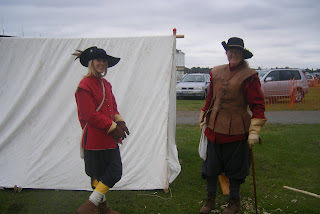 Title: Food and Cooking in the 17th century: History and Recipes by Peter Brears.
Title: Food and Cooking in the 17th century: History and Recipes by Peter Brears.Bought at: Amazon.co.uk
Price: 0.01 pounds (+ 2.75 shipping)
I am aware my research method has very little of method. I'm all over the place, to be honest. But it's not just because I'm lazy and with a very limited attention span. I truly believe one does not have to know every little stat of the socio-economic situation of England in the 17th century. Good research does not equal good writing. Specially if you are not trying to write a realistic, 100% accurate novel about the period. And I'm not. From the first line I wrote I knew I wanted a novel that was experimental and subjective, about feelings and perspectives, about the tricks of memory rather than the actual reality of the time. I have not just one but two unreliable narrators - and not-really-veiled 21st century voice carrying the story. There's nothing I hate more than those historical novels with colourless 3rd person omniscent narrators void of personality or style. But I also wanted to do enough research so that any mistakes and anacronisms would be conscious and intended.
Most of my research I want to be focus on "mood research" - that is, I really wanted to experience the world of my characters as much as I could, going to the places of my story, seeing the objects of their everyday lives for myself rather in a picture in a book. I want to hear the music of the time and see the paintings.
This little book helps with that - it's important to know what the people of the 17th century were eating (and who knows, maybe I'll try one of the recipes myself one day, if I'm brave enough to try and cook it), it helps when it comes to putting yourself in their shoes. So that's why this little cute book is a lot of help. Specially because it's easier to find out what the high classes and royalty were eating in those days but not so easy to find depictions of food for the average people. And this is exactly it: everyday, easy recipes of the 17th century. It offers a brief and concise story of cooking during the period and then many examples of traditional recipes.
To make a Shropsheere cake: Take two pound of dryed flour after it has been searced fine, one pound of good sugar dried and searced, also a little beaten sinamon or some nottmegg greeted and steeped in rose water; so straine two eggs, whites and all, not beaten to it, as much unmelted butter as will work it to a paste: so mould it & roule it into longe rouses, and cutt off as much at a time as will make a cake, two ounces is enough for one cake: then roule it in a ball between your hands; so flat it on a little white paper cut for a cake, and with your hand beat it about as big as a cheese trancher and a little thicker than a past board then prick them with a comb not too deep in squares like diamons and prick the cake in every diamon to the bottom; so take them in a oven not too hot: when they rise up white let them soake a little, then draw. If the sugar be dry enough you need not dry it but searce it: you must brake in your eggs after you have wroat in some of your butter into your flower: prick and mark them when thy are cold: this quantily will make a dozen and two or three, which is enough for my own at a time: take off the paper when they are cold.
A really good buy. And economical - it was second hand but in perfect condition.
The author has a bunch of other books on the subject that I'm dying to check out (there's only a couple of them available in the Kensington libraries so tough luck).

















